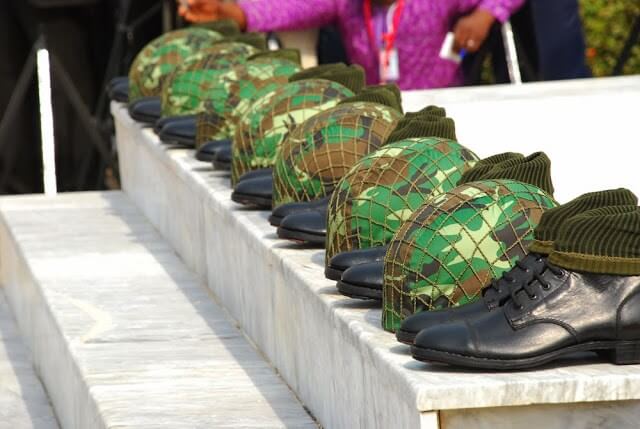More Revelations On How Nigerian Military ‘Converted Farmland To Graveyard To Bury Soldiers Secretly’
More revelations have emerged on how the Nigerian military, in a bid to allegedly cover-up massive deaths of soldiers being killed at the battle front by Boko Haram, has converted a farmer’s farmland into a graveyard where it allegedly buries slain soldiers secretly.
The military had on Thursday refuted an investigative report by the Wall Street Journal, where it was revealed that the military had allegedly buried at least 1,000 soldiers killed by the Islamic State’s West Africa Province-affiliated Boko Haram insurgents.
Advertisement
In the WSJ report published on Wednesday, the newspaper claimed that the Nigerian military had established a “secret graveyard” around the Maimalari military cantonment in Maiduguri, Borno State, where it covertly buries soldiers who fell at the battle front.
The Defence Headquarters had in reaction on Thursday acknowledged the existence of the said graveyard, but denied conducting secret burials for its fallen heroes.
But in a series of tweets on Thursday, the Africa Bureau Chief of the Wall Street Journal, Joe Parkinson, gave more insight on how the military allegedly bury fallen soldiers at night using torchlights.
Parkinson, who tweeted via his verified twitter handle (@JoeWSJ), said “Some unit commanders don’t report deaths to preserve budget allocations. Others divert budgets for guns and ammo into their own pockets,” adding that, “Soldiers are barred from speaking to the media” on the true situation of the terror war.
Advertisement
His tweets partly read, “As Nigeria commiserates the 10 year anniversary since the eruption of the Boko Haram insurgency, the Presidency & Military are still repeating the line that the militants have been “technically defeated.” Here is a story that shows the reality behind those soundbites.
“This is the Maimalari barracks, the main military base in Maiduguri. At its northern end is a field of churned soil that conceals a hidden tomb. Nigerian soldiers are buried there in unmarked graves.
“The bodies of soldiers are buried at night, by torchlight, and are covertly transported to the burial site from the base’s crowded morgue. The trenches dug are by infantrymen or local villagers paid a few dollars per shift.
“Nigeria last summer effectively stopped reporting the deaths of soldiers on the northern front where it is fighting Boko Haram & ISWAP, a splinter group loyal to Islamic State. In that period, more than 1000 soldiers have been killed. Some say the numbers are considerably higher.
“The unmarked graveyard in Maimalari barracks is not the only one, government officials and diplomats say.
Advertisement
“Sarah James, who lives in a village opposite Maimalari base, says she can no longer farm in the area. The perimeter of the base has been expanded “so they can bury the forces.”
“Mercy Tamuno’s husband, Adah was killed by ISWAP November. When she demanded to see where he was buried, she was taken to a grave with a plastic bottle that had his name scrawled on it in pen. Adah’s comrades say he was buried days earlier in the secret graveyard.
“These human tragedies are part of a broader malaise. Units that have suffered casualties and declining morale aren’t in a position to attack, and are instead defending poorly constructed bases in exposed areas against an increasingly well-equipped enemy.
“Soldiers are barred from speaking to the media. Some unit commanders don’t report deaths to preserve budget allocations. Others divert budgets for guns and ammo into their own pockets, soldiers and diplomats said.
“Military analysts say the bravery of the troops on the ground are being undermined by poor decisions by some of the senior commanders. “There is a systemic misrepresentation of the war that is having severe tactical and operational consequences,” said one.
“Last week we wrote about the heroism of Nigeria’s bombsquad — the men and women risking their lives to diffuse children strapped with bombs by Boko Haram.
Advertisement
“But the reality across much of the northern front is that one of Africa’s most powerful military forces is struggling. In some cases families wait for months before they receive any news about their loved ones.
“The culture of secrecy over casualties has become so pervasive that we may never know how many soldiers have been killed. It is unclear whether even Nigeria’s top political leaders are aware of the gravity of the situation.”



